Christa’s Zauberkasten
Our fourth journey takes us to Girenbad in the Zurich Oberland, to the cheese dairy of Christa Egli, who cossets her customers and stuns the experts with her creations.
Our fourth journey takes us to Girenbad in the Zurich Oberland, to the cheese dairy of Christa Egli, who cossets her customers and stuns the experts with her creations.
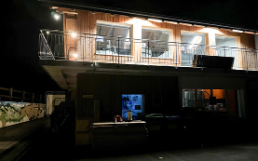
The planning phase took ages, partly because of the difficulty in obtaining a permit for extending the still-small cheese dairy, which is located in the agricultural zone. Christa made the best possible use of the time, enthusiastically developing a unique concept for producing a wide variety of cheeses. The new building has been in operation since 2020, and has lived up to the high expectations surrounding it. Large windows and a cheese tour provide for transparency, allowing for a direct and authentic appreciation of the passion that goes into cheese artisanship.
The construction of the cheese dairy is also exemplary in terms of food safety. There is slight excess pressure in the production area to prevent the entrance of undesirable microorganisms or insects when the doors are opened.
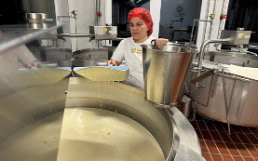
The milk is pumped only once at the time of delivery, with gravity then responsible for its conveyance along a natural gradient for all further stages of the process.
The fat content of the cheeses is not adjusted by the usual means of a centrifuge. Instead, the evening milk settles overnight in two vats, and the following morning the cream is skimmed off by hand with a ladle and the milk distributed to the various cheese vats – the same process that Christa learned from her grandfather. Since most of the microflora are to be found in the cream, the microbiological balance can be adjusted during the skimming process.
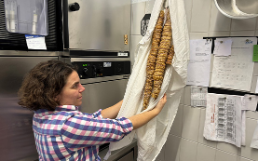
Christa places great store in cultivating traditional artisanship and in maximum differentiation of her operation from industrial cheese production. In addition to the processing of raw milk, this involves the use of traditional microbial cultures. Except for ‘Felsbrocken’ (a planing cheese) and ‘Crème’ (for fondue mixtures), portions of Fettsirten culture and Fettsirten-Magenlab (a natural whey starter culture produced by adding cut-up calf ‘vells’ or stomachs to the milk prior to incubation) are always added to each cheese variety. Both of these cultures are incubated for 1 to 2 days at 32 °C. This temperature promotes the growth of mesophilic lactic acid bacteria, which are beneficial for soft and semi-hard cheeses whose curd is not heated to as high a temperature in the vat. In the photo, Christa is showing the calf vells used to produce the Fettsirten-Magenlab. To achieve curdling of the milk within the desired time, rennet powder is also used.
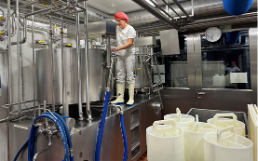
Depending on the season, 12 to 15 different cheese varieties are produced at the Girenbad Cheese Dairy, or a multiple thereof if the different ingredients and formats are taken into account. This is only possible because Christa designed the dairy for precisely this purpose. The dairy has a total of 11 finishing vats of different sizes, all of them relatively small. They are all fitted at a height, so that gravity-filling is possible. The smallest batches of cheese, such as the raw-milk ‘Tommli’, are made in a small tub. Although she sets great store by tried-and-tested methods, Christa is also open to trying new approaches. Thus, for example, with ‘Heuhuufe’, which is actually a semi-hard cheese, she has also adopted important process steps from fresh-cheese technology – and the ‘Sparflamme’ variety boasts an impressive, particularly energy-saving production process, in which e.g. the cheese curd is heated solely with water from heat recovery.
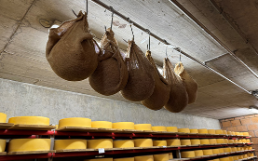
A wide variety of ripening methods are an integral part of this cheese-lover’s paradise. The water used to care the cheese is enriched with a wide array of ingredients. The nut cheese ripens hanging in fabric sacks and there is a small vaulted cellar for the mould-ripened varieties.
Some of the cheeses are ripened in the village of Saland (Tösstal, Canton of Zurich), at the cheese dairy natürli zürioberland AG.
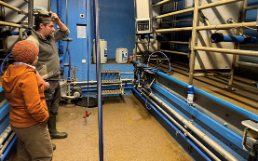
The six farmers bring their unchilled milk twice daily to the cheese dairy. Christa pays them an above-average price in return for meeting the high quality standards. The procedure for dealing with milk that falls short of these standards is very strict; the milk cannot be used for cheesemaking until a subsequent investigation confirms that the defects have been identified and remedied.
A visit to a dairy farmer revealed the impressive wealth of knowledge and experience to which special attention must be paid in milk production. It comes as no surprise that Christa’s Girenbad milk suppliers almost never fail to meet her quality standards. This close collaboration between farmer and cheesemaker is an important foundation for producing safe, flavourful, high-quality raw-milk products.
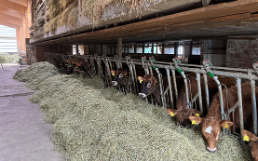
Three-quarters of the cheeses are sold under the ‘natürli’ brand. Since 1995, natürli zürioberland AG has offered its urban customer base a wide and varied range of high-quality cheeses and dairy products from small regional cheese dairies with the aim of promoting production and sales in the Zurich mountain region. Christa is very aware of the fact that her customers are on the one hand looking for original products, but on the other have increasing high standards regarding animal welfare and ecological footprint.
She is also a very interesting and competent discussion partner on these topics, and clearly holds the view that cows should be fed as high a proportion as possible of grass and hay produced on permanent grasslands. These permanent grasslands include natural meadows and pastures, which in Switzerland account for 58% of the utilised agricultural area. It is only thanks to ruminants that food production on this land is at all possible. Christa acknowledges the reasoning behind vegan cheese alternatives, but notes that Swiss agricultural resources are used in their production and that these should be processed in an environmentally sound manner. She has herself conducted initial experiments in her kitchen with these alternative products.
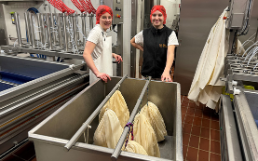
The variety of products and processes involved requires all employees to assume a high degree of responsibility. The team consists of 15 people, many of them part-timers. Two-thirds are women, and Christa feels that this is a good balance, since “men primarily see the work and women tend to see the product”. Men therefore mainly make suggestions for increasing efficiency, and women for improving the product.
The training of dairy technologists is a high priority here. The Girenbad cheese dairy is an exceptionally attractive training farm due to the wide variety of products produced here and its diverse team with their unique expertise and palpable passion for high-quality cheese.
Another thing that stood out was that things never became hectic during the cheesemaking process; rather, employees worked in a calm and focused manner.
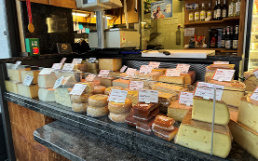
Although the rule is to select no more than four types of cheese for the sensory description, we were utterly spoilt for choice and only managed to narrow the tasting down to five cheeses.
All of the cheeses are exceptionally precocious for their age, melt wonderfully on the tongue and boast a harmonious, lingering finish. It is quite possible that the added Fettsirte cultures and Fettsirtenmagenlab are a decisive influence on the character of the cheeses.
The sensorial description also evoked various childhood memories, all without exception positive. Artisan cheeses elicit positive emotions.
Christa’s magic can be continued in your own home, since all of these cheeses are ideally suited to a wide range of pairings. We tested a total of 11 different fruit mustards and chutneys with the cheeses and identified many delightful ‘marriages’. Common to them all was that the cheeses softened the sharpness and rounded out the flavour, as well as an emergence of many new dimensions of flavour. The combination of Bachtelstei with the Cassis de Dijon mustard was a riotous roller coaster ride with fruity, spicy and floral flavours. Paired with the fig-lavender chutney, Heuhuufe carried us off on holiday with a visit to a Provençal market. Together with Sparflamme, the chilli-tomato chutney lit a veritable firework on the palate without coming across as burning or pungent. Teamed with the apricot-chilli chutney, the Ur-Eiche conjured up Christmassy flavours of citrus fruits (especially orange), cinnamon and gingerbread. All these flavours were absent from both chutney and cheese when sampled on their own. Raspberry mustard also greatly enhanced the Ur-Eiche, with notes of a wide range of garden berries and fruits of the forest. With Felsbrocken we were most delighted by the pairing with pear mustard, yielding a gorgeous caramel note, a touch of rhubarb and various culinary herbs.
Common to all these pairings was a stunning, long-lasting finish that invited one to indulge and dream. If only it were possible to stop time. What magic! Many thanks to Christa and her team.
Last modification 23.02.2024